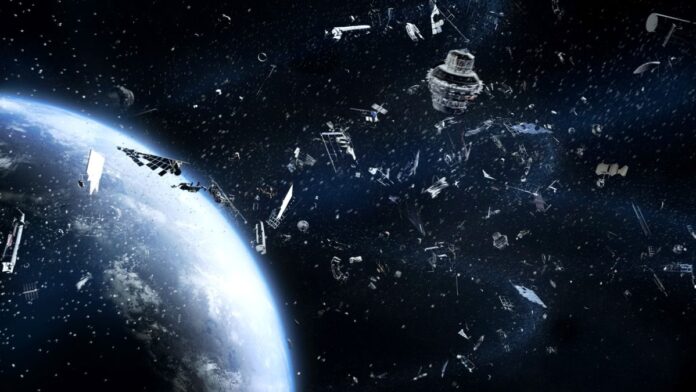NASA scientists and other experts have called for a legally binding treaty to ensure “space junk” caused by the burgeoning space industry doesn’t irreparably threaten activities in Earth’s orbit.
The space closely surrounding our planet is becoming increasingly crowded with over 9,000 satellites in orbit today, and the Eastern Southern Observatory (ESO) projects that this number may grow as high as 75,000 by 2030.
Though satellite technology inarguably provides a wealth of benefits here on Earth, the growth of this industry could make large areas of Earth’s orbit unusable. The problem is compounded by disused satellites still in orbit colliding and creating smaller fragments that are hard to track.
“Satellites are vital to the health of our people, economies, security, and Earth itself. However, using space to benefit people and the planet is at risk,” one of the experts urging for the space junk treaty and Head of Spaceport Cornwall, Melissa Quinn, said in a statement. (opens in new tab) “Humanity needs to take responsibility for our behaviors in space now, not later. I encourage all leaders to take note, to recognize the significance of this next step, and to become jointly accountable.”
Related: Getting space junk under control may require an attitude shift
Estimates predict that there could already be over 100 trillion pieces of old satellites orbiting the planet that are untracked. This presents a major risk to other satellites. Hundreds of collision avoidance maneuvers are performed by satellites each year to avoid clashes that would not only cause damage to operational satellites or even destroy them, to would also generate even more space junk.
The UK Natural History Museum (opens in new tab) explains that this space junk doesn’t currently pose a threat to space exploration, but recent incidents have provided stark examples of how quickly a dangerous situation for astronauts could arise.
As Space.com previously reported in October 2022, the International Space Station (ISS) was forced to take evasive action to dodge a fragment of space junk from a Russian satellite that was destroyed by a widely-condemned anti-satellite missile test in 2021. In November 2021, astronauts aboard the ISS were forced to take shelter in their transport spacecraft when the space station passed uncomfortably close to space junk. And just this week, the ISS had to fire its thrusters to maneuver out of the way of an Earth-imaging satellite.
In their call for a treaty, the NASA Jet Propulsion Laboratory scientists along with researchers from the University of Plymouth, the Arribada Initiative, the University of Texas at Austin, California Institute of Technology, Spaceport Cornwall and Zoological Society of London (ZSL) all emphasized the urgent need for a global consensus on how to manage Earth’s orbit.
The scientists, including experts in satellite technology and oceanic microplastics, say that the agreement to ensure satellite sustainability should place responsibility for debris on satellite users and producers from the point they launch onwards. When looking at ways to incentivize accountability, the experts say that factors like commercial costs should be considered.
This means the suggested move is consistent with a recent United Nations (U.N) treaty to address plastic pollution in the sea agreed upon by 200 countries called the Global Plastics Treaty. The treaty took 20 years to implement and scientists are keen to avoid the same delay in tackling the space junk problem.
One of the scientists urging for the treaty is University of Plymouth research fellow, Dr. Imogen Napper.
“The issue of plastic pollution, and many of the other challenges facing our ocean, is now attracting global attention. However, there has been limited collaborative action and implementation has been slow. Now we are in a similar situation with the accumulation of space debris,” Napper said. “Taking into consideration what we have learned from the high seas, we can avoid making the same mistakes and work collectively to prevent a tragedy of the commons in space. Without a global agreement, we could find ourselves on a similar path.”
The scientists raised their concerns and urged for the treaty in the journal Science (opens in new tab).
Follow us @Spacedotcom (opens in new tab), or on Facebook (opens in new tab) and Instagram (opens in new tab).

